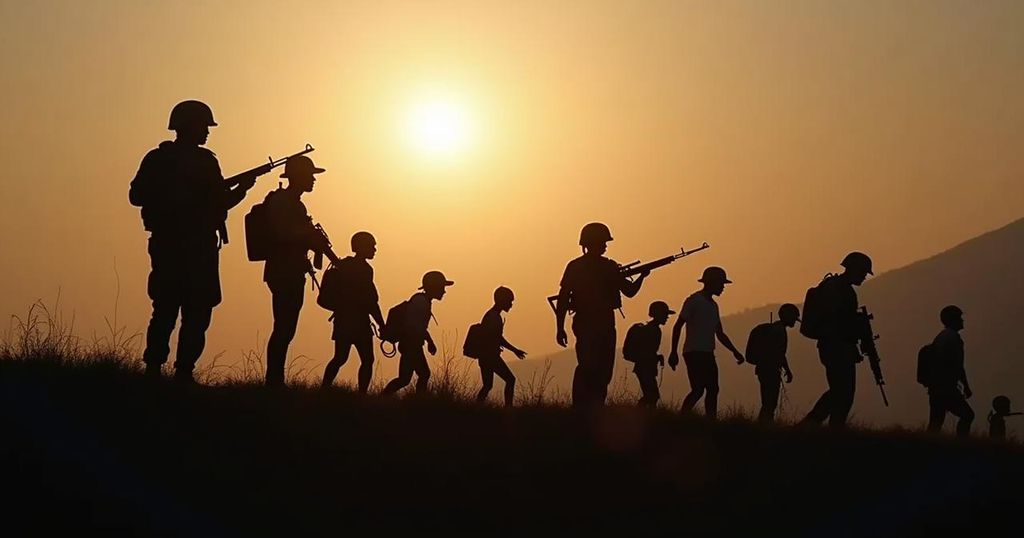Tragic Shooting of Migrants by Mexican Army Raises Human Rights Concerns
Mexican army troops shot dead six migrants from various countries, including Egypt, Peru, and El Salvador, in an incident described as “deplorable” by President Claudia Sheinbaum. Ten others were injured. Peru’s Foreign Ministry has demanded an urgent investigation. This incident highlights the ongoing issues of violence against migrants and the militarization of immigration policies in Mexico.
In an alarming incident near the Guatemalan border, Mexican army troops opened fire on a truck transporting migrants, resulting in the death of six individuals from Egypt, Peru, and El Salvador. Mexican President Claudia Sheinbaum characterized the event as “deplorable,” and it raises grave concerns regarding the treatment of migrants in Mexico. The shooting not only injured ten other migrants but also marks one of the most severe incidents involving migrant fatalities at the hands of state authorities in recent years. Following this tragic occurrence, Peru’s Foreign Ministry confirmed the death of a Peruvian national and has called for an urgent investigation into the matter, particularly highlighting the precarious relations between Peru and Mexico that have deteriorated since a diplomatic conflict in 2022. President Sheinbaum stated that the two soldiers responsible for the shootings have been referred to civilian prosecutors and are undergoing questioning. However, as of yet, no formal charges have been filed against them. The investigation will also expand to assess whether any commanding officers may be held accountable, with Sheinbaum asserting that such events must not be repeated. Despite this, she notably refrained from addressing these shootings during a subsequent event at a military base in Mexico City, where she pledged loyalty to her by high-ranking army officials, amid discussions of wage increases for military personnel. The shooting incident occurred on Tuesday near Huixtla in Chiapas, a southern state known for its role in migrant smuggling. According to reports from Mexico’s Defense Department, soldiers opened fire after purportedly hearing gunshots as a convoy of trucks approached their position. Following the gunfire, four migrants were found deceased in one truck, with subsequent fatalities occurring among the injured. There were a total of 33 migrants in the vehicle, and some reports suggest the armed forces mistook the situation due to the chaotic environment prevalent in the region, which has been marked by drug cartel conflicts. Migrant rights advocate Irineo Mujica expressed skepticism regarding the possibility that migrants or their smugglers would have initiated fire against military personnel, indicating that bribery often allowed for safe passage in such high-risk areas. The Mexican Council of Bishops condemned the killings as a disproportional use of lethal force and pointed to a larger implication of a militarized immigration policy increasing the presence of armed forces at the border.
This incident reflects a broader trend in Mexico concerning the militarization of immigration enforcement, particularly under the recent administrations that have afforded greater power to military and paramilitary forces in domestic affairs. With a rise in violence against migrants amid ongoing drug cartel activities, the Mexican authorities have faced scrutiny over their policies and actions regarding human rights and the treatment of vulnerable populations. Such incidents not only strain diplomatic relations with migrant-source countries but also highlight the systemic issues surrounding migration prosecution and public safety.
This shooting incident represents a severe violation of migrant rights and poses significant questions about the military’s role in civil law enforcement. As investigations continue, the demand for accountability grows, underscoring the urgent need for reforms in immigration policy and government oversight to prevent similar tragedies in the future. The reactions from both Peruvian authorities and human rights advocates point to a recognition that the treatment of migrants needs to shift towards a more humane and just approach.
Original Source: abcnews.go.com




Post Comment